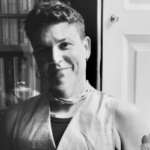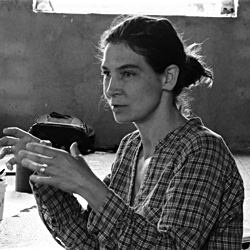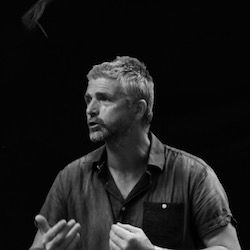a holistic approach to activist training and education.
This course aims to support activist-trainers and facilitators in applying holistic training methods to work with activists and change-makers.
Ulex Project has been developing and working with an Integral Activist Training approach in all of our courses and events over the last 15 years. This approach to course design and facilitation, recognises the interconnected nature of the personal, the interpersonal and the political, so all our training work aims to support integrated transformation in all three of these spheres.
This Training for Trainers will share what we’ve learnt about this kind of approach over these years, offering a systematic framework for thinking about design, skills development and competencies – so you can apply it to your work.
Change is multi-layered. The social field, our organisational cultures, and the individuals within them arise in mutual dependence upon each other. Integral Activist Training supports integrated transformation on all of these levels.
There are four key areas we have defined within Integral Activist Training. It should be: Holistic, Transformative, Participatory, and Rooted in Solidarity.
TRANSFORMATIVE
To design and facilitate through the Transformative lens means shaping activist education that actively supports real change — in people, in groups, and in the wider world. Transformative training helps participants not only gain new skills or knowledge, but shift how they see, think, and act. It connects learning directly to the social and ecological struggles we are part of, ensuring that our educational work is in service of strategic, systemic transformation. As a trainer, this means creating spaces where participants can critically examine the assumptions behind their actions and views, reflect on their effectiveness and impact, and explore approaches and strategies that serve the bigger picture. Transformative training builds capacity for collective agency — helping movements become more reflective, adaptive, and powerful. It recognises that education should be a practice of freedom (as Paulo Freire described it): engaging critically and creatively with reality to enable meaningful collective action. To be Transformative, training work needs to be strategic, connected, responsive, able to hold complexity, and oriented towards ‘the good of the whole’.
PARTICIPATORY
To make activist education Participatory means designing and facilitating learning spaces where everyone is actively engaged in shaping the process and the outcomes. Participation goes beyond simply involving people — it’s about co-creation, collective inquiry, and shared ownership of learning. Drawing on traditions of popular and experiential education, Participatory training challenges the hierarchical, teacher-student cultures of knowledge transfer. While honouring that there is important responsibility to be taken in holding the position of ‘facilitator’ or ‘trainer’, Participatory approaches assume that everyone has something to offer as well as something to learn, and is bringing valuable experience and perspective to the group, from their unique position. The facilitators’ work is to find ways to draw this knowledge and experience in.
For activist-trainers, this means designing sessions that are experience-based, dialogical, and responsive to the needs and realities of those present. It involves creating opportunities for peer-to-peer exchange, experimentation, and critical reflection — balancing structure with openness to what can emerge through genuine collaboration. Participatory education helps us learn from each other’s struggles, strengthen solidarity, and build the collective agency we need for effective action. When everyone participates fully, learning becomes dynamic, creative, and alive — the group’s intelligence can be expressed in a way that is greater than the sum of its parts.
HOLISTIC
To design and facilitate through a Holistic lens means recognising the interdependence of all dimensions of change — the personal, the interpersonal, the socio-political, and the ecological. A holistic approach to activist education invites us to work with the whole system and the whole person. It values clarity of thought and strategic analysis, but also recognises that deep transformation requires engaging our emotions, bodies, and relationships. As trainers, this means creating learning spaces that speak to the intellect, the heart, and the senses — places where people can think critically, feel deeply, and connect meaningfully with themselves, each other, and the living world around them.
Holistic learning develops emotional literacy and embodied awareness, supporting resilience and long-term engagement. It honours the wisdom held in our felt experience as well as in our collective field of interaction, understanding that how we relate is part of what we learn. When we bring these dimensions together, we foster a more integrated form of activism — one that can sustain both people and movements, and that reflects the systemic nature of the changes and impacts we are seeking.
ROOTED IN SOLIDARITY
To work in ways that are Rooted in Solidarity means ensuring that our educational practice actively embodies the values we strive for in the wider world. It calls on us to pay attention to how power operates within our groups — noticing the positions we each hold, how our identities and worldviews shape our relationships, and how these dynamics influence the learning process itself. As activist-trainers, this means designing spaces that help participants recognise and navigate these complexities with skill and care, turning awareness of difference into a resource for deeper connection and collective strength.
Being rooted in solidarity goes beyond simply inviting participation or representation; it is about cultivating an ethical orientation that resists reproducing systems of domination. It asks us to hold a strong sense of grounding in our shared humanity, and to act from values that move beyond guilt, shame, or reactivity. In practice, this means fostering cultures of respect, accountability, and mutual support — learning environments where people can bring their full selves and engage with honesty and compassion. When we do this well, our training not only reflects but also practices embodying the kind of world we are working to create: one based on justice, care, and connection.
So this course will help you to:
Who is it aimed at?
Activist – trainers involved in and through training practice supporting socially engaged action addressing ecological, political and social justice issues. We embrace a broad definition of activism, including: Resistance – action preventing further damage to ecosystems and social justice; Renewal – action focused on developing and creating alternatives for healthier societies and communities; and Building Resilience – action supporting increased resilience in communities to weather the uncertain times ahead.
Note that this training is aimed at activists already in training/facilitation roles and with experience of holding activist educational spaces.
The main spoken language on the course will be English.
For accessibility and venue information see here.
In the solidarity economy:
(See details of our approach to radical economics here)
Contact us
to apply

Location:
Ilaj’s background is in grassroots organising, involving them in various strands of social movement work for nearly two decades, mostly in Eastern and Southern Europe. In more recent years, they have turned their attention to broader European movement building as part of the Ulex core team, where they design programmes, coordinate training teams and facilitate on a wide range of training courses. Ilaj is an experienced trainer with a broad range of skills, particularly in holding space for collective exploration of burnout, weathering repression, navigating trauma and cultivating solidarity in social movements. They are passionate about working with body awareness as a radical means of deconstructing internalised systems of oppression. They have been exploring the intersection between transformative somatics and political organising for a number of years.

Location:
María worked for the Red Cross in community development, strengthening civil society, education, and food security in Latin America and Africa. Building on her studies in social psychology and international development, she studied Alternative Economics at Schumacher College, UK. This led her into work on organisational change with NGOs and grassroots movements. María specialises in complexity and participation applied to organisations: organisational structures and culture, emergent strategy, leadership amongst others. She co-founded The Eroles Project, a learning for action project and La Bolina, a systemic project looking at repopulation, inclusion and agroecology. María´s co-authored: Small is Important: Learnings from an integration and regeneration Project. Factores Clave para la Acción Reflexión Colaborativa, Enfoques y herramientas participativas en la cooperación al desarrollo, Activism and spirituality.

Location:
G has been involved in social movement organising and education since the late 1980’s. He is a highly regarded trainer and has designed numerous training programmes covering areas such as psychosocial resilience in activism, the ecology of social movements, and leaderful organising. As a founding member of the Ulex Project, he is known for highly innovative work blending pedagogical methodologies. This holistic approach to activist learning has inspired numerous training initiatives across Europe. He currently steers the strategic development of the Ulex Project and its social movement capacity building programme.

Location:
An Maeyens (she/her) is a facilitator and trainer with over two decades of experience in grassroots movements. She specialises in creative, inclusive agenda design and brings deep expertise on group culture, power dynamics, and transformative learning. Starting of in the anti-globalisation movement she has trained thousands in civil disobedience, supported international coalitions, and developed multilingual training programmes and toolkits. Her work spans movements, cultures, and countries, guided by a commitment to care, accessibility, and leaderful organising.

Location:
Ari’s activism began in 2002, at age 16, as a Bosnian refugee in Canada, where they founded and coordinated a group for LGBTIQ high school students and allies. They were a co-founder and leader at kolekTIRV in Croatia and Trans Network Balkan, involved in community organizing, advocacy, program management, team coordination, capacity building, education, media work, campaigns, events, fundraising, etc. In 2024, they joined the Supervisory Board of the Croatian Trade Union Collective of United Precarious Workers and Activists (SKUPA).
Beyond the Balkan region, Ari served as a Board member at Transgender Europe (TGEU), where they held roles as Secretary, Treasurer, and later Co-chair. They have also been a trainer with the Center for Artistic Activism and served on the Advisory Committee and since 2022 as a Community Care Facilitator at FRIDA — The Young Feminist Fund. Since 2024 they are the Operations Manager at Global Philanthropy Project.

Location:
Sergio (all pronouns) was born in Romania and migrated to Germany in the early 2010s. In the past, he was a social worker with homeless people and a social consultant for Eastern European migrants for various organisations. Trained as a filmmaker, he spent two years making a documentary about the ‘civic reawakening’ in Romania and the waves of protest it brought with it. In connection to this, Sergio is currently co-steering the development of an online open-source participative knowledge production platform on activism in Romania. Over the past nine years, Sergiu has offered his skills to various journalists, grassroots collectives and campaigns, mostly working within the labour rights, climate justice, international solidarity and anti-authoritarian movements in Germany and Romania. Nonetheless, his biggest focus since 2020 has been his work as an organiser with the anarcho-syndicalist Free Workers Union, where he focuses mostly on organising Romanian migrant workers on construction sites, in factories and in the agricultural field.

Location:
Linzy Na Nakorn is a movement director, politicised somatics practitioner, community organiser and facilitator. For the past decade she has been facilitating movement, body work and creating theatre, dance and participatory performance that advocates for and organises with communities in pursuit of housing, disability and racial justice. Her movement practice focuses on trauma-informed approaches to building resilience, capacity and joy via way of the body for personal, interpersonal and community sustainability. Linzy was a Co-Director of The Big Ride for Palestine in partnership with The Gaza Sunbirds, Native Woman Ride and Middle East Children’s Alliance; using cycling as a tool for mobilising active solidarity and in support of campaigning for the rights and self-determination of the Palestinian people. Linzy is part of a UK network of activists and artists advocating for Radical Care – supporting organisations, researchers and institutions to work towards system change in societal approaches to labour, leadership and access.

Location:
Jeroen (he/him pronouns) has been involved in grassroots social movements for more than two decades now, starting back when he was fifteen. Throughout the years the fights for “climate justice” and “migrant justice” have been consistently on top of the list of struggles that make his heart beat faster. A key transformative moment for Jeroen was reading Paulo Freire’s Pedagogy of the Oppressed. Freire’s revolutionary pedagogy gave him a language to support the creation of emancipatory learning environments, rooted in a desire for collective liberation. Jeroen has also been exploring in depth Boal’s Theatre of the Oppressed and Joanna Macy’s The Work That Reconnects among other methodologies to build his trainer’s toolkit. Inspired by the liberatory possibilities of these traditions, he started an organization with a friend, LABO vzw, based in Belgium, where he has worked as a trainer and campaigner between 2013 and 2023.

Location:
Ella brings more than 10 years’ external experience working with not for profit and community based organisations across diverse themes including: advocacy for migrant communities; local community engagement in national policy making; and structural relationships between poverty and disenfranchisement, and education and poverty. Immersed in critical theory in her early 20s she brings a holistic and questioning approach, and is passionate about systemic solutions that centre relationship and interconnection between ecology and society. A long standing member of the collective, Ella has been part of the core team since the inception of the Ulex Project. Her work bridges facilitation, developing project partnerships, governance, strategy, operations, and project and programme evaluation. She has developed and overseen more than 70 partnerships with a range of different actors across European social movements.
Ulex: Latin (argelaga Catalan, gorse English) noun:
1. A thorny-evergreen flowering shrub, with a high capacity for regeneration and resilience. Its seedpods open in contact with fire and it reshoots from charred stumps. A successionary plant that grows well under challenging conditions. It improves soil fertility through nitrogen fixing, preparing the way for renewed biodiversity.
2. A traditional choice for igniting fires. Burns hot and bright.
3. A networked project adding nutrition and fertility to European social movements through training and capacity building. It kindles the realisation of social justice, ecological intelligence, and cognitive vitality.